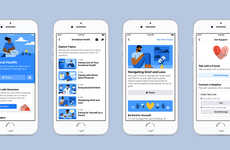



Mental health platforms focus on specific demographics, needs, or approaches
Trend - As more mental health-focused platforms become available, they're becoming increasingly targeted in who they cater to, and/or their approach to supporting users. Examples include everything from gender-specific platforms to ones that offer low-cost support.
Insight - Mental health has been a growing focus among consumers in North America as activists and experts in this space have spent years making efforts to destigmatize mental health issues. Now, consumers are more likely to want support for their mental wellbeing, and turn to businesses, platforms and services that target their specific needs.
Insight - Mental health has been a growing focus among consumers in North America as activists and experts in this space have spent years making efforts to destigmatize mental health issues. Now, consumers are more likely to want support for their mental wellbeing, and turn to businesses, platforms and services that target their specific needs.
Workshop Question - How is your brand prioritizing its customers' and employees wellbeing?
Trend Themes
1. Targeted Mental Health Platforms - As mental health becomes a growing focus, platforms are becoming increasingly targeted to support specific demographics or approaches, opening opportunities for businesses to create specialized solutions.
2. Affordable and Convenient Counseling Services - Online counseling services such as BetterHelp offer fast and affordable mental health support with a global reach, creating opportunities for businesses who can provide similar effective mental health support.
3. Multifunctional Wellness Platforms - Platforms such as Bravely offer a range of tools and knowledge needed to help people lead a healthier life, including a break from doomscrolling, creating opportunities for other businesses to create multi-functional mental health solutions.
Industry Implications
1. Tech Industry - The tech industry has the opportunity to create cutting-edge digital mental health solutions supported by AI, machine learning and other technologies to disrupt the traditional access to healthcare services.
2. Retail Industry - The retail industry can develop new innovative mental health products and services and blend a more holistic approach, beyond just catering physical needs, to build stronger customer engagement and loyalty.
3. Fitness Industry - The fitness industry can recognize the interconnection between mental and physical health, offering members gyms that include tools and resources to support overall wellbeing.













































